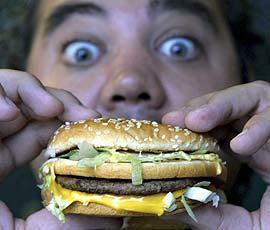So many people have guilty feelings about food. "Should I eat this?" "Should I be eating now?" "Why can't I get my weight right?
Food and nutrition is a topic about which millions of us agonise. We feel guilty about eating as such, about overeating, about eating certain foods, about weight and about our inability to lose weight.
I'm not entirely sure why we feel so guilty about many aspects of food and related subjects such as weight control. But I do think that the media have much to answer for. We are constantly being bombarded by messages that tell us it's bad and sinful to eat certain foods and woe betide anyone who actually enjoys eating. They are doomed to suffer the torments of overweight and disease.
Yes, overeating and overindulgence can cause you to gain weight and eating foods that are high in fat on a regular basis will have negative health implications, but whatever happened to enjoying a meal or eating healthy foods with relish?
Good or bad choice?
A while ago, I received a question from a forum user on eating muesli. This user confessed that she has a BMI of 18, which is just still within the normal range, but teetering on the brink of underweight, and here she is worrying that muesli may be fattening and "a bad choice".
Muesli is an excellent food brimming with healthy nutrients such as dietary fibre, vitamins, minerals, antioxidants and monounsaturated fats. Eaten together with fat-free milk or yoghurt it is one of the most nutritious breakfast foods at our disposal. And yet here is a person who is very nearly underweight, who is agonising about muesli being fattening and a poor choice.
Other users write in total desperation that they just can't lose another gram and when I work out their BMI, they are in the anorexic range. One reader complained that her body fat percentage was too high, when it hovered around 14%. According to experts like Prof Tim Noakes, only elite female athletes manage to reduce their body fat percentage to 14%. All other women with a normal weight are supposed to have a body fat percentage of about 24%.
Consequences of guilt
For those of you who are desperate about eating in general, about eating certain foods and about wanting to lose weight when your ribs are already sticking out, please remember that your guilt can lead you down the path of eating disorders and that it can also lead to nutritional deficiencies.
For example, many women think that they should not use any milk or dairy products, because they contain so much fat. Well, if you stop drinking milk and eating yoghurt and cottage cheese, you are depriving yourself of the very best sources of calcium and may be laying the foundations for future osteoporosis.
If you worry and stress yourself excessively about eating and certain foods, you will actually activate your adrenal cortex, which produces hormones such as cortisol. This will make you receptive to infections and viruses and cause water retention – things you certainly don't need in your life.
Solutions
If you have serious hang-ups about food and eating, you need expert assistance to get you out of the vicious cycle of guilt. Consider consulting a clinical psychologist to banish the underlying fears and imprinted guilt.
Various types of therapy may be beneficial, particularly if your fears of food and weight gain are based on childhood conditioning. If your father always made disparaging remarks about your looks, or your mother always urged you to "watch your figure", it's not difficult to imagine that this could lead to a lifelong aversion to eating or desperate attempts to control your weight.
If you're following a totally unbalanced diet - for example, a diet that contains so few kilojoules that it would not keep a bird alive - but you are scared to have even an extra mouthful of food because it could make you fat, then consult a clinical dietician to help you get back to eating normally again.
If you're not dangerously underweight and hovering on the brink of anorexia, and you have guilt feelings if you dare to eat more than your strictly imposed regimen allows you, then take a few sensible steps to free yourself.
Firstly, you need to acknowledge that you feel guilty about eating and certain foods. Examine this fear and these feelings and then do something about them. If you're underweight, then try eating larger portions of the foods you usually eat and add some healthy options such as fresh fruit, lean meat or fish, fat-free yoghurt or milk, whole grains or any other healthy food that you can think of.
If you can eat normally and tell yourself that this isn't a sin, that you won't balloon if you have a slice of wholewheat bread with peanut butter, and that your body needs a variety of foods, then you'll be taking the first steps towards dietary freedom.
(Dr IV van Heerden, DietDoc, updated December 2011)
Read more:
The ultimate weight loss guide
Food diaries are the way to go
Calculate your Body Mass Index
Any questions? Ask DietDoc




 Publications
Publications
 Partners
Partners










